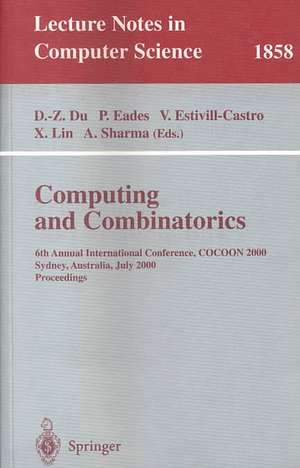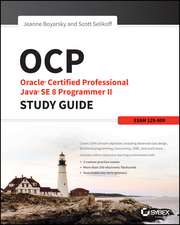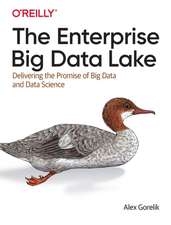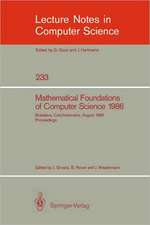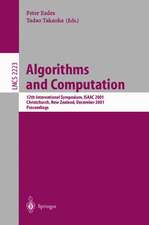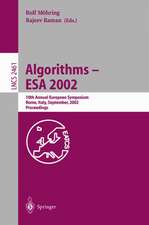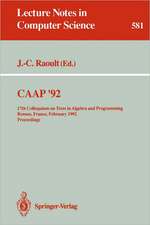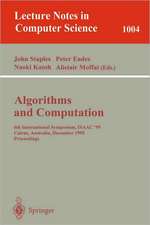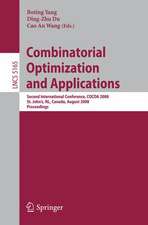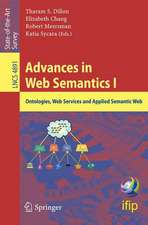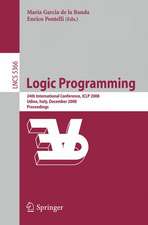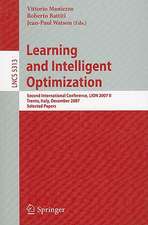Computing and Combinatorics: 6th Annual International Conference, COCOON 2000, Sydney, Australia, July 26-28, 2000 Proceedings: Lecture Notes in Computer Science, cartea 1858
Editat de Ding-Zhu Du, Peter Eades, Vladimir Estivill-Castro, Xuemin Lin, Arun Sharmaen Limba Engleză Paperback – 12 iul 2000
Din seria Lecture Notes in Computer Science
- 20%
 Preț: 1061.55 lei
Preț: 1061.55 lei - 20%
 Preț: 307.71 lei
Preț: 307.71 lei - 20%
 Preț: 438.69 lei
Preț: 438.69 lei - 20%
 Preț: 579.30 lei
Preț: 579.30 lei -
 Preț: 410.88 lei
Preț: 410.88 lei - 17%
 Preț: 427.22 lei
Preț: 427.22 lei - 20%
 Preț: 596.46 lei
Preț: 596.46 lei - 15%
 Preț: 448.04 lei
Preț: 448.04 lei - 20%
 Preț: 353.50 lei
Preț: 353.50 lei -
 Preț: 389.49 lei
Preț: 389.49 lei - 20%
 Preț: 309.90 lei
Preț: 309.90 lei - 20%
 Preț: 645.28 lei
Preț: 645.28 lei - 20%
 Preț: 763.23 lei
Preț: 763.23 lei - 15%
 Preț: 580.46 lei
Preț: 580.46 lei - 20%
 Preț: 310.28 lei
Preț: 310.28 lei - 20%
 Preț: 655.02 lei
Preț: 655.02 lei - 20%
 Preț: 1183.14 lei
Preț: 1183.14 lei - 20%
 Preț: 340.32 lei
Preț: 340.32 lei -
 Preț: 449.57 lei
Preț: 449.57 lei - 20%
 Preț: 591.51 lei
Preț: 591.51 lei - 18%
 Preț: 938.83 lei
Preț: 938.83 lei - 20%
 Preț: 337.00 lei
Preț: 337.00 lei - 20%
 Preț: 649.50 lei
Preț: 649.50 lei - 20%
 Preț: 607.40 lei
Preț: 607.40 lei - 20%
 Preț: 1414.79 lei
Preț: 1414.79 lei - 20%
 Preț: 1024.44 lei
Preț: 1024.44 lei - 20%
 Preț: 583.40 lei
Preț: 583.40 lei - 20%
 Preț: 453.32 lei
Preț: 453.32 lei - 20%
 Preț: 575.49 lei
Preț: 575.49 lei - 20%
 Preț: 1075.26 lei
Preț: 1075.26 lei - 20%
 Preț: 585.88 lei
Preț: 585.88 lei - 20%
 Preț: 825.93 lei
Preț: 825.93 lei - 17%
 Preț: 360.20 lei
Preț: 360.20 lei - 20%
 Preț: 763.23 lei
Preț: 763.23 lei - 20%
 Preț: 340.32 lei
Preț: 340.32 lei - 20%
 Preț: 504.58 lei
Preț: 504.58 lei - 20%
 Preț: 369.13 lei
Preț: 369.13 lei - 20%
 Preț: 580.93 lei
Preț: 580.93 lei - 20%
 Preț: 343.62 lei
Preț: 343.62 lei - 20%
 Preț: 350.21 lei
Preț: 350.21 lei - 20%
 Preț: 583.40 lei
Preț: 583.40 lei - 20%
 Preț: 583.40 lei
Preț: 583.40 lei - 15%
 Preț: 438.59 lei
Preț: 438.59 lei - 20%
 Preț: 341.95 lei
Preț: 341.95 lei - 20%
 Preț: 238.01 lei
Preț: 238.01 lei - 20%
 Preț: 538.30 lei
Preț: 538.30 lei
Preț: 342.28 lei
Preț vechi: 427.85 lei
-20% Nou
Puncte Express: 513
Preț estimativ în valută:
65.52€ • 71.19$ • 55.07£
65.52€ • 71.19$ • 55.07£
Carte tipărită la comandă
Livrare economică 21 aprilie-05 mai
Preluare comenzi: 021 569.72.76
Specificații
ISBN-13: 9783540677871
ISBN-10: 3540677879
Pagini: 496
Ilustrații: XII, 478 p.
Dimensiuni: 155 x 235 x 26 mm
Greutate: 0.69 kg
Ediția:2000
Editura: Springer Berlin, Heidelberg
Colecția Springer
Seria Lecture Notes in Computer Science
Locul publicării:Berlin, Heidelberg, Germany
ISBN-10: 3540677879
Pagini: 496
Ilustrații: XII, 478 p.
Dimensiuni: 155 x 235 x 26 mm
Greutate: 0.69 kg
Ediția:2000
Editura: Springer Berlin, Heidelberg
Colecția Springer
Seria Lecture Notes in Computer Science
Locul publicării:Berlin, Heidelberg, Germany
Public țintă
ResearchCuprins
Invited Talks.- Theoretical Problems Related to the Internet.- Recent Progress and Prospects for Integer Factorisation Algorithms.- Hao Wang Award Paper.- Approximating Uniform Triangular Meshes in Polygons.- The Best Young Researcher Paper.- Maximum Induced Matchings of Random Cubic Graphs.- Computational Geometry 1.- A Duality between Small-Face Problems in Arrangements of Lines and Heilbronn-Type Problems.- On Local Transformation of Polygons with Visibility Properties.- Graph Drawing.- Embedding Problems for Paths with Direction Constrained Edges.- Characterization of Level Non-planar Graphs by Minimal Patterns.- Rectangular Drawings of Plane Graphs Without Designated Corners.- Computing Optimal Embeddings for Planar Graphs.- Graph Theory and Algorithms 1.- Approximation Algorithms for Independent Sets in Map Graphs.- Hierarchical Topological Inference on Planar Disc Maps.- Efficient Algorithms for the Minimum Connected Domination on Trapezoid Graphs.- Complexity, Discrete Mathematics, and Number Theory.- Parameterized Complexity of Finding Subgraphs with Hereditary Properties.- Some Results on Tries with Adaptive Branching.- Optimal Coding with One Asymmetric Error: Below the Sphere Packing Bound.- Closure Properties of Real Number Classes under Limits and Computable Operators.- Graph Theory and Algorithms 2.- A Characterization of Graphs with Vertex Cover Six.- On the Monotonicity of Minimum Diameter with Respect to Order and Maximum Out-Degree.- Online Algorithms.- Online Independent Sets.- Two-Dimensional On-Line Bin Packing Problem with Rotatable Items.- Better Bounds on the Accommodating Ratio for the Seat Reservation Problem.- Ordinal On-Line Scheduling on Two Uniform Machines.- Parallel and Distributed Computing.- Agents, Distributed Algorithms, and Stabilization.- A Fast Sorting Algorithm and Its Generalization on Broadcast Communications.- Efficient List Ranking Algorithms on Reconfigurable Mesh.- Computational Geometry 2.- Tripods Do Not Pack Densely.- An Efficient k Nearest Neighbor Searching Algorithm for a Query Line.- Tetrahedralization of Two Nested Convex Polyhedra.- Efficient Algorithms for Two-Center Problems for a Convex Polygon.- Combinatorial Optimization.- On Computation of Arbitrage for Markets with Friction.- On Some Optimization Problems in Obnoxious Facility Location.- Generating Necklaces and Strings with Forbidden Substrings.- Optimal Labelling of Point Features in the Slider Model.- Data Structures and Computational Biology.- Mappings for Conflict-Free Access of Paths in Elementary Data Structures.- Theory of Trinomial Heaps.- Polyhedral Aspects of the Consecutive Ones Problem.- The Complexity of Physical Mapping with Strict Chimerism.- Learning and Cryptography.- Logical Analysis of Data with Decomposable Structures.- Learning from Approximate Data.- A Combinatorial Approach to Asymmetric Traitor Tracing.- Removing Complexity Assumptions from Concurrent Zero-Knowledge Proofs.- Automata and Quantum Computing.- One-Way Probabilistic Reversible and Quantum One-Counter Automata.- Similarity Enrichment in Image Compression through Weighted Finite Automata.- On the Power of Input-Synchronized Alternating Finite Automata.- Ordered Quantum Branching Programs Are More Powerful than Ordered Probabilistic Branching Programs under a Bounded-Width Restriction.
Caracteristici
Includes supplementary material: sn.pub/extras
